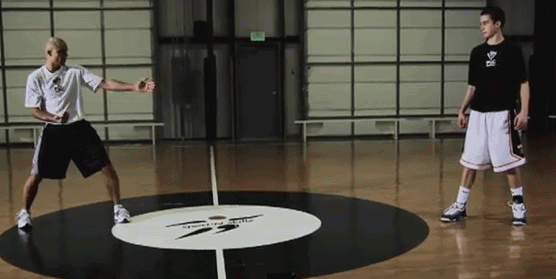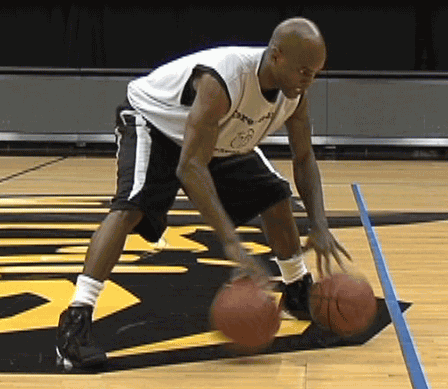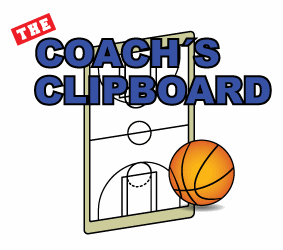When Individual Instruction Goes Too Far, by Thomas Emma
From the Coach’s Clipboard Basketball Playbook"Helping coaches coach better..."
Tom Emma was a graduate of Duke University, where he was a three-year basketball starter and captain his senior year, and was later drafted by the Chicago Bulls in 1983. He held a Masters degree from Columbia University, specialized in sports conditioning, was the owner of Power Performance, Inc. and published several books. Tom authored several other articles on this website. Sadly (after the original posting of this article), Tom died on June 8, 2011... Coach Gels.
No one even casually involved in the sports world would deny that there is no shortage of individual instruction available to athletes today. Independent strength and conditioning specialists, skill development trainers, speed coaches, nutritionists, sports psychologists, time management experts, to name but a few, abound throughout the athletic community.
While the influx of these individuals, in my opinion, has been a net positive for sports performance (what did you expect me to say, I am in the business myself), there are also some potential pitfalls that can actually hinder an athlete's development. Below the most prominent of these pitfalls are discussed in detail.

I'll speak for myself (and I'm sure for many others) and say that my most creative moments in terms of developing new moves and shots on the basketball floor came about when practicing alone. No coaches. No trainers. No teammates. No opponents. No outside direction. Just me, the court, the rim, and the ball.
This was the time I felt totally free and had complete licence to experiment without hindrance. Just ask anyone who creates for a living, such as a songwriter, artist, or novelist and he will quickly tell you that solitude, freedom of expression, and an uncluttered mind are the keys to creativity.
Perhaps having company on the court would have made some of my workouts more efficient (for instance, time would have been saved if I had a partner flagging down my jump shots), but I'm confident that many of my unique spin dribbles and fall-away jump shots would never have materialized. So no matter how much outside help you employ during a given week remember not to forsake your individual training sessions. Your creative spirit-not to mention your athletic potential- will be glad you didn't.
Over Reliance on Assisting Personal
I've known quite a few athletes at a variety of levels (i.e., professional, college, high school, junior high school, etc.) who are basically incapable of working out by themselves. Hard to believe I know but unfortunately true. I'm aware of this problem because a few of the players are among my current clients!
While I'm flattered to be perceived as indispensable and thankful for the business, I am nevertheless strongly opposed to such reliance. In fact, it can be downright dangerous to your development as an athlete. I encourage all the players I'm involved with regardless of talent level to become comfortable with and competent at working out alone.
Eventually, having someone on hand all the time guiding your workouts will hinder your ability to structure and execute your own training sessions when trainers, for whatever reason, are unavailable. As one experienced coach told me, "ingrained habits such as always engaging in supervised training are like comfortable chairs, easy to fall into, hard to get out of".
It is imperative that along with your assisted workouts you spend at least a small percentage (and perhaps more than a small percentage) of your time training by yourself. This will ensure that you will be able to keep the improvement process moving forward with or without assisting personnel. Think of it as an insurance policy for your career.
Picking the Wrong Expert
Thankfully the large majority of athletic enhancement specialists active today are at the very least competent. However, as in any field, there is a small minority who are unqualified and just not up to the task. Working with these individuals even for a short period of time can be detrimental to your athletic development.
At best you will waste precious time. At worst you'll develop bad habits from their teachings. Either way, you want to avoid these incompetents at all costs. The best way to do this is prior to choosing someone to work with solicit recommendations from those in the athletic community you respect such experienced coaches, successful athletes, and school athletic department personnel.
From there, do a trial run before you sign on (usually a few sessions will be enough to tell if he or she is for you). Once you decide on an expert from a specific discipline do your level best to stay with them. This continuity will prove helpful to your improvement and simplify your training regime.
Loss of Flexibility
As someone who trains athletes for a living, I know all too well that scheduling glitches are an occupational hazard. If I had a nickel for every time a workout was changed or cancelled at the last minute... well you know the rest. Because of this reality, athletes must have the capacity to improvise-and yes go it alone if need be.
Inevitably there will be instances when schedules with trainers don't jibe. Being flexible, in this case engaging in a productive training session by yourself when a supervised workout is cancelled or postponed, will keep your athletic development on track. I also have found that the flexibility to call your own shots in terms of workout scheduling and planning periodically breeds responsibility. Flexibility is an important trait for any athlete's body. Make it the same for your training schedule.
Satisfaction
Achieving success in the world of sports brings with it great satisfaction. Winning a game or event, exceeding a personal best, making a team, or earning extra playing time are just a few of the ways you can draw satisfaction from athletic competition. However, the most satisfying feelings I've experienced as an athlete didn't have anything to do with direct competition.
It involved the mastering of a skill (or set of skills) that I spent hours diligently working on by myself without any active outside influences. Knowing that I needed nothing more than my own ingenuity and physical effort to achieve a worthwhile athletic goal was extremely empowering, confidence promoting, and, above all, satisfying . I encourage all athletes to experience this type of satisfaction by spending ample time training and honing their skills and their bodies alone.
Risk of Overtraining
The physical demands an athlete must endure during training and competition are exceptional. These demands can become exacerbated by constant supervised workouts, thus resulting in overtraining. When your body is in an overtrained state performance suffers noticeably and you become much more susceptible to injury.
Worse yet, once the effects of overtraining set in it can take weeks or even months before the symptoms totally subside. I've known dedicated players who in the same day engaged in a weight room workout with a strength coach for two hours in the early morning, joined an organized group for a hour long agility/speed training session after lunch, and followed it up by participating in an evening summer league game.
Even the most highly conditioned athlete would be flirting with overtraining if the above detailed day was a regular occurrence. As such, athletes and those close to them must monitor overall weekly training volume closely, and if extra work with a trainer pushes the physical burden over the top, it should be discontinued or at least postponed until the training/competition schedule lightens.

For me the most longstanding and rewarding byproduct of developing my skills in my own company has been how it has translated into my ability to teach others. The long hours of solitary trial and error practice has helped me to produce a huge arsenal of unique drills and techniques which have become second nature.
Possessing this second nature knowledge allows me to teach aspiring athletes in a confident, straight forward, and understandable manner with a minimal amount of fluff and maximum effect. In short, I know what works. And perhaps more important, I know what doesn't.
I also have an appreciation for how it feels to challenge yourself physically and mentally without any outside support or encouragement. Anytime you acquire knowledge from first hand experience in an ultra-receptive state (i.e., at a young age in solitude), it becomes ingrained in your being for life.
Training exclusively under the tutelage of experts may very well hasten your learning curve, but the depth of what you learn will be somewhat shallow. It's tantamount to riding in the passenger seat of a car rather than driving yourself. Chances are you'll still get to your destination, but the exact route you took may not be 100% clear in your mind.
While reaching your highest potential is your priority now, coaching and/or teaching the game or sport may very well be in your future (I'd say eight in 10 of my basketball teammates in college are involved in the game one way or the other to this day). Give yourself the best chance to be successful at passing on what you've learned. Make training alone a consistent part of your improvement regime.
Peacefulness
For me at least, there has always been a certain sense of peacefulness that comes with training/improving alone. During these singular sessions my mind and body often seemed to merge into a meditative state that brought about extreme concentration and contentment.
Two circumstances that frequently elicited this peaceful feeling were my long runs along the scenic beaches of my native Long Island as I endeavored to build my leg strength and conditioning for the upcoming basketball campaign and the many hours I spent perfecting my shots and moves on my driveway basketball court at night under the small spot light that hung over the garage.
Believe it or not, I can even remember clearly one particular evening over 30 years ago in which a light, soft snow fell as I emulated the quick release of former Houston Rockets scoring machine, Calvin Murphy (Murphy, for those too young to remember, was one of the first small guards-5"9" at best-to be a prodigious scorer in the NBA and NCAA).
So don't deprive yourself of these peaceful and transcendent moments. Get out there once in a while and do it yourself!



